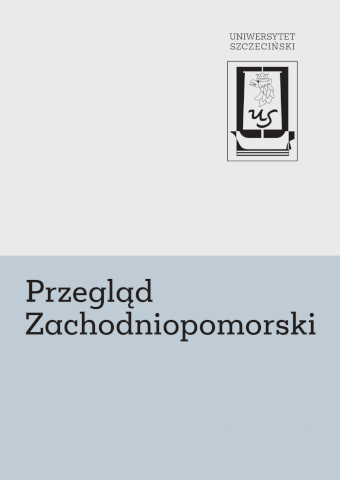








| Authors: |
Wojciech
Wichert
dr, Szczecin |
| Keywords: | the Third Reich propaganda German cinema |
| Data publikacji całości: | 2015 |
| Page range: | 28 (79-106) |
| 1. | Bordwell D., Thompson K., Film history: An introduction, New York 1994. |
| 2. | Brockmann S., A critical history of German film, New York 2010. |
| 3. | Dolezel S., Loiperdinger M., Hitler in Parteitagsfilm und Wochenschau, w: Führerbilder. Hitler, Mussolini, Roosevelt, Stalin in Fotographie und Film, München 1995. |
| 4. | Drzazga D., ,,Nie jesteśmy pruderyjni”, czyli wizerunki kobiet i mężczyzn w filmach Trzeciej Rzeszy, w: Media, ciało, pamięć. O współczesnych tożsamościach kulturowych, red. A. Gwóźdź, A. Sieracka-Ćwikiel, Warszawa 2006. |
| 5. | Evans R., Das Dritte Reich. Diktatur, München 2010. |
| 6. | Fest J., Hitler. Eine Biographie, Frankfurt am Main–Berlin–Wien 1973. |
| 7. | Gabauer K., Das Bild Leni Riefenstahls in den bundesdeutschen Printmedien (Examarbeit), München 2002. |
| 8. | Grundberger R., Historia społeczna Trzeciej Rzeszy, t. 2, Warszawa 1987. |
| 9. | Hake S., Film in Deutschland. Geschichte und Geschichten seit 1895, Hamburg 2004. |
| 10. | Hinton D.B., The films of Leni Riefenstahl, London 1991. |
| 11. | Kershaw I., Hitler a wyjątkowość nazizmu, w: idem, Hitler, Niemcy i ostateczne rozwiązanie, tłum. R. Bartołd, Poznań 2010. |
| 12. | Kershaw I., Niemiecka opinia powszechna a ,,kwestia żydowska”, 1939–1943: kilka dalszych refleksji, w: idem Hitler, Niemcy i ostateczne rozwiązanie, tłum. R. Bartołd, Poznań 2010. |
| 13. | Kershaw I., The Nazi dictatorship. Problems and perspectives of interpretation, London 1993. |
| 14. | Król E.C., Propaganda i indoktrynacja narodowego socjalizmu w Niemczech 1919–1945, Warszawa 1999. |
| 15. | Loiperdinger M., Der Parteitagfilm ,,Triumph des Willens” von Leni Riefenstahl. Rituale der Mobilmachung, Leverkusen 1987. |
| 16. | Longerich P., Nationalsozialistische Propaganda, w: Deutschland 1933–1945. Neue Studien zur nationalsozialistischen Herrschaft, red. K.-D. Bracher, M. Funke, H.-A. Jacobsen, Bonn 1992. |
| 17. | Nazizm, Trzecia Rzesza a procesy modernizacji, wybór i oprac. H. Orłowski, Poznań 2000. |
| 18. | Protte K., Hitler als Redner in Fotografie und Film, w: Hitler der Redner, red. J. Kopperschmidt, München 2003. |
| 19. | Przylipiak M., Poetyka kina dokumentalnego, Gdańsk–Słupsk 2004. |
| 20. | Rich R.R., Leni Riefenstahl the deceptive myth, w: Sexual stratagems: the world of women in film, red. P. Erens, New York 1979. |
| 21. | Rother R., Führerkult als Film „Triumph des Willens”, w: Ein Volk dankt seinem (Ver)führer. Die Reichserntedankfeste auf dem Bückeberg 1933–1937. Vorträge zur Ausstellung, red. G. Biegel, W. Otte, Braunschweig 2002. |
| 22. | Rother R., Leni Riefenstahl. The seduction of genius, New York 2002. |
| 23. | Ruck M., Führerabsolutismus und polykratisches Herrschaftsgefüge – Verfassungsstrukturen des NS-Staates, w: Deutschland 1933–1945. Neue Studien zur nationalsozialistischen Herrschaft, red. K.-D. Bracher, M. Funke, H.-A. Jacobsen, Bonn 1992. |
| 24. | Saryusz-Wolska M., Film – propaganda – ideologia. „Triumf woli” Leni Riefenstahl, w: Sztuki wizualne jako nośniki ideologii, red. M. Lisiecki, Toruń 2009. |
| 25. | Schmölders C., Twarz Hitlera. Biografia fizjonomiczna, tłum. M. Chojnacki, Gdańsk 2010. |
| 26. | Spindler D., Der nationale Mythos am Beispiel Leni Riefenstahls Film Triumph des Willens (Studienarbeit), München 2002. |
| 27. | Taylor R., Film propaganda: Soviet Russia and Nazi Germany, New York 1998. |
| 28. | Thamer H.-U., Das Dritte Reich. Interpretationen, Kontroversen und Probleme des aktuellen Forschungsstandes, w: Deutschland 1933–1945. Neue Studien zur nationalsozialistischen Herrschaft, red. K.-D. Bracher, M. Funke, H.-A. Jacobsen, Bonn 1992. |
| 29. | Toeplitz J., Historia sztuki filmowej, t. IV 1934–1939, Warszawa 1969. |
| 30. | Tomasulo F.T., The mass psychology of fascist cinema. Leni Riefenstahl’s ,,Triumph of the will”, w: Documenting the documentary. Close readings of documentary film and video, Detroit (Michigan) 2009. |
| 31. | Trimborn J., Riefenstahl. Niemiecka kariera, tłum. A. Kowaluk, K. Kuszyk, Warszawa 2008. |
| 32. | Urban M., Die Konsensfabrik. Funktion und Wahrnehmung der NS-Reichsparteitage 1933–1941, Göttingen 2007. |
| 33. | Welch D., Propaganda and the German cinema 1933–1945, Oxford 1983. |
| 34. | Wichert W., Film jako instrument propagandy w III Rzeszy, w: Konstelacja Szczecin. Aktorzy szczecińscy i kino okresu międzywojennego, red. R. Skrycki, Szczecin 2011. |
| 35. | Wichert W., Zasada wodzostwa w III Rzeszy w latach 1933–1939. Teoria i praktyka ustrojowa, praca magisterska w zbiorach Zakładu Badań Niemcoznawczych IHiSM Uniwersytetu Szczecińskiego, Szczecin 2008. |
| 36. | Wieland K., Dietrich & Riefenstahl. Der Traum von der neuen Frau, München 2011. |
| 37. | Zelnhefer S., Die Reichsparteitage der NSDAP, Nürnberg 1991. |
| 38. | Kracauer S., Od Caligariego do Hitlera. Z psychologii filmu niemieckiego, tłum. E. Skrzywanowa, W. Wertenstein, Gdańsk 2009. |
| 39. | Machcewicz P., Spory o historię 2000–2011, Kraków 2012. |
| 40. | Schreckenberg H., Ideologie und Alltag im Dritten Reich, Frankfurt am Main 2003. |
| 41. | Vat van der D., Albert Speer. Życie i kłamstwa, tłum. M. Przeczek, Warszawa 1997. |
| 42. | Benz W., Vom Freiwilligen Arbeitsdienst zur Arbeitsdienstpflicht, ,,Vierteljahrshefte für Zeitgeschichte” 1968, z. 4. |
| 43. | Król E.C., Leni Riefenstahl – życie i twórczość, ,,Studia nad Faszyzmem i Zbrodniami Hitlerowskimi” 2001. |
| 44. | Przylipiak M., Triumf woli, ,,Studia Filmoznawcze” 2002, t. 23. |
| 45. | Sonntag S., Fascynujący faszyzm, ,,Magazyn Sztuki” 1996, nr 12. |
| 46. | Zentner Ch., Bedürftig F., Blutfahne, w: Das grosse Lexikon des Dritten Reiches, red. Ch. Zentner, F. Bedürftig, München 1985. |
| 47. | Dreßen W., Politische Leiter, w: Enzyklopädie des Nationalsozialismus, red. W. Benz, Stuttgart 2007. |
| 48. | Riefenstahl L., Memoiren, t. 1, Frankfurt am Main–Berlin 1987. |
| 49. | ,,Da bleibt Schuld, so kann man das nennen”: Gespräch mit Leni Riefenstahl, ,,Die Welt”, 8.05.2000. |
| 50. | Bronfen E., Triumph der Verführung, ,,Die Zeit”, 19.10.2000. |
| 51. | Kurek K., Propaganda w służbie totalitaryzmów, w: II wojna światowa. Nazistowskie rządy, t. 20 (dodatek do ,,Rzeczpospolitej”), red. A. Dąbrowska, Warszawa 2009. |
| 52. | Rothers R., Hitler-eine Liebesgeschichte, ,,Die Welt”, 2.09.2000. |
| 53. | Nowak K., Ideologia zamknięta w kadrze. ,,Triumf woli” Leni Riefenstahl, ,,Histmag. Pierwszy polski portal historyczny”, http://histmag.org/?id=3959. |
| 54. | Thamer H.-U., Wirtschaft und Gesellschaft unterm Hakenkreuz, w: Nationalsozialismus II, ,,Informationen zur politischen Bildung” 2002, z. 266, www.bpb.de/ publikationen/01158073712671365731706452990874,0,0,Wirtschaft_und_Gesellschaft_unterm_Hakenkreuz.htm |